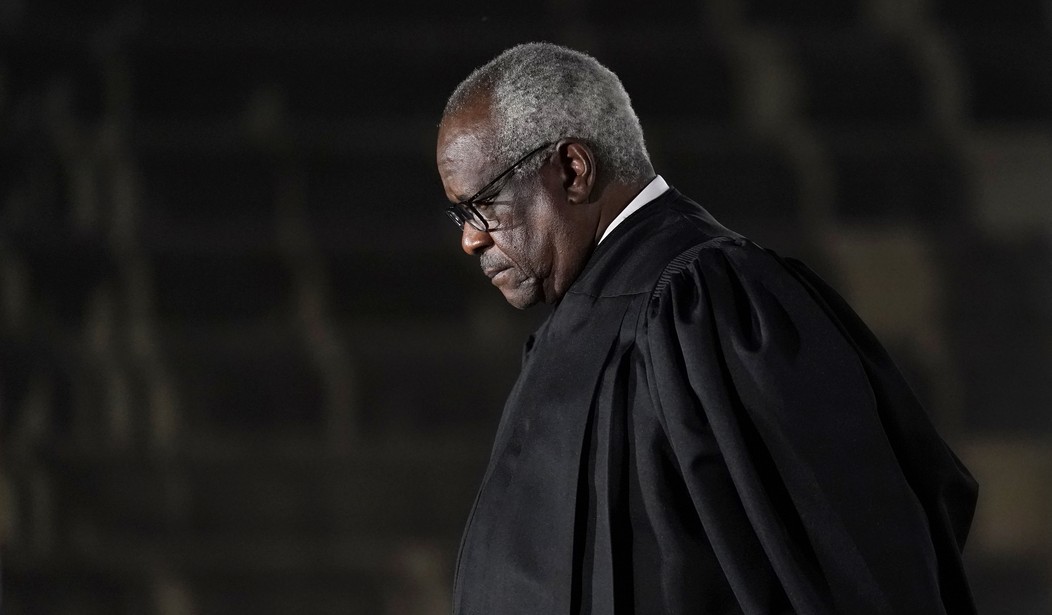Will Dobbs settle once and for all whether Chief Justice John Roberts has any real influence on the “Roberts Court”? Or will it just settle one score in particular? While we wait for the eventual decision on Dobbs and how much of Justice Samuel Alito’s leaked draft opinion survives, all we can do is speculate, hold our breath until the decision … or wait for another leak.
CNN legal analyst Joan Biskupic prefers to speculate, just like everyone else does. Based on comments made last week by Justice Clarence Thomas, Biskupic sees the hidden drama of the Dobbs debate as a generational battle between Thomas and Roberts, and the status of Roe as the ultimate trophy:
CNN previously reported that Roberts was trying to forestall reversal of Roe, even though he favors upholding the Mississippi ban on abortions after 15 weeks of pregnancy.
Whether he has made progress is not known, but Roberts has a record of orchestrating 11th hour turnarounds in major cases, much to the consternation of his conservative brethren.
Thomas’ remarks pulled back the curtain on the tensions inside. Perhaps they revealed long simmering sentiment for a chief who has wrenched relations over the years. Or perhaps they reflected the internal recriminations over who might be responsible for disclosing the draft opinion. Or perhaps they indicate that the apparent five-justice majority to overturn Roe is not so secure.
It is not unusual to hear Thomas deride the court’s traditional adherence to precedent, what’s known by the Latin phrase of stare decisis. “We use stare decisis as a mantra when we don’t want to think,” he insisted in an Atlanta speech in early May.
But Thomas’ sudden aim at Roberts’ leadership is new. In the Dallas appearance, his message to the chief justice came down to: The court was better before you arrived.
Was that the message? That seems rather doubtful, for a couple of reasons. First off, the role of Chief Justice is vastly overblown. Roberts doesn’t direct much except who gets to write majority opinions, and even then only on cases in which he’s in the majority. He gets paid a little more as well, but other than some other minor seniority perqs, Roberts is just another seat on the bench. All he can do is persuade, not order, and he has only as much power to manipulate as his persuasion allows.
The real point Thomas made last week is that the court has been affected by the politics surrounding judicial confirmations. The hyperpartisan, hyperactivist environment surrounding the court is almost certainly what produced the most destructive leak in modern Supreme Court history. The angry mobs surrounding the houses of justices since then don’t just support Thomas’ point, but also Alito’s arguments in the Dobbs draft that Roe warped and poisoned the proper constitutional role of the judiciary. To the extent that the present line-up isn’t as collegial as in Thomas’ early days, he sees that as a product of that drift from judicial to legislative work.
But Thomas may have a real sore point with Roberts in particular. If the leaks and rumors are correct, it seems as though Roberts wants to conduct a replay of the 2012 ObamaCare case, in which Roberts played politics in order to protect the court from political blowback. His efforts to push justices into a bizarre save-Roe-dump-Casey compromise would make that warping even more apparent and the court even more nakedly legislative.
Biskupic seems to think that Roberts is attempting a replay, too:
Roberts, with his institutionalist approach, is positioned as the one justice who might generate a compromise opinion that stops short of completely overturning Roe v. Wade, at least this year. That would thwart an outcome that Thomas has worked toward for decades. …
Roberts, in contrast to Thomas, has a reputation inside the court for being guarded, even secretive.
Some conservatives still fault him for a late switch in votes to save the Obama-sponsored Affordable Care Act in 2012. In that instance and others when Roberts joined with liberals for a compromise, the shift stopped the court from reeling too far right and reflected his institutionalist interests.
Well, that’s certainly one way to put it. Another would be that Roberts used his swing vote to endorse the tax argument that the Obama administration not only hadn’t made but had explicitly disavowed in order to burnish his reputation. YMMV, but you don’t have to guess how Thomas felt about Roberts’ “11th-hour turnaround” in that case. He and the other four dissenters accused Roberts of “judicially rewriting” the ACA, and that Roberts did so to “escape what Congress enacted: a mandate … enforced by a penalty.”
Roberts could do that in 2012 because the court was split 4-4 with himself in the middle. All he had to do was persuade himself. This time, however, Roberts finds himself on the outside looking into a five-seat conservative majority. If anything, Thomas (and Alito) want to make sure that Roberts doesn’t keep playing politics by issuing judicially and constitutionally incoherent rulings just to keep favor with the press and the Beltway elite. Given what we know about Thomas, he probably sees that as the poison that led to this moment, and that the best antidote is to make sure you don’t get another dose of it.
Will he succeed? We’ll know in about six weeks at most … or sooner, if we get more leaks.







Join the conversation as a VIP Member